Export Development Canada (EDC) stands as a pivotal force in scaling water technology solutions globally. With its recently launched $5 billion Trade Impact Program and deep expertise in cleantech financing, EDC offers water entrepreneurs and impact investors a unique pathway to expand their innovations beyond Canadian borders. The crown corporation’s strategic focus on wastewater treatment technologies and major utility infrastructure, combined with its growing presence in the Indo-Pacific region, creates compelling opportunities for water sector players looking to make their mark on the global stage.
Export Development Canada is part of my Ultimate Water Investor Database, check it out!
Investor Name: Export Development Canada
Investor Type: Gov. Fund
Latest Fund Size: $5000 Million
Dry Powder Available: Yes
Typical Ticket Size: $10M – $30M
Investment Themes: wastewater solutions, wastewater technology, water utility infrastructure
Investment History: $26083333.33 spent over 3 deals
Often Invests Along:
Already Invested In: Fibracast Ltd., Hortau Inc., Ostara Nutrient Recovery Technologies Inc.
Leads or Follows: Follow
Board Seat Appetite: Rare
Key People:
EDC’s Investment Approach: Following the Flow

Export Development Canada’s strategic approach to water technology investments reflects a carefully calibrated balance between supporting innovation and managing risk. As a strategic follower rather than lead investor, EDC positions itself to maximize impact while maintaining prudent oversight of public funds.
The organization’s investment strategy centers on providing growth capital to established water technology companies that have already demonstrated market validation. By focusing on Series A and B funding rounds with deal sizes typically ranging up to $25 million, EDC helps bridge the critical growth phase where many promising water innovations traditionally struggle to secure capital.
This follower approach serves multiple strategic purposes. First, it allows EDC to leverage the due diligence and market validation work already conducted by lead investors, reducing risk while still participating in high-potential opportunities. Second, it enables the organization to deploy its $5 billion Trade Impact Program more efficiently across a broader portfolio of water technology companies.
EDC’s investment criteria emphasize companies that have moved beyond initial product development and pilot testing to achieve early commercial traction. The ideal investment candidate has proven technology, initial revenue streams, and strong management teams capable of scaling operations. This focus on growth-stage companies aligns with research showing that water technology commercialization typically requires longer timelines.
The organization’s investment thesis recognizes that water technology companies often face unique commercialization challenges, including long sales cycles, complex regulatory requirements, and conservative customer adoption patterns. By providing patient capital alongside strategic investors, EDC helps these companies navigate the valley of death between innovation and widespread market adoption.
Beyond direct investment, EDC’s follower strategy allows it to participate in broader ecosystem development. The organization frequently co-invests alongside corporate strategic partners, other government agencies, and specialized water technology investors. This collaborative approach helps build the networks and partnerships critical for scaling water innovations.
While EDC maintains strict investment discipline around deal size and stage, it remains flexible in considering various water technology subsectors – from digital solutions and advanced materials to resource recovery and infrastructure optimization. This breadth allows it to support diverse approaches to addressing water challenges while maintaining focus on commercially viable solutions with clear paths to scale.
Making Waves in Water Tech
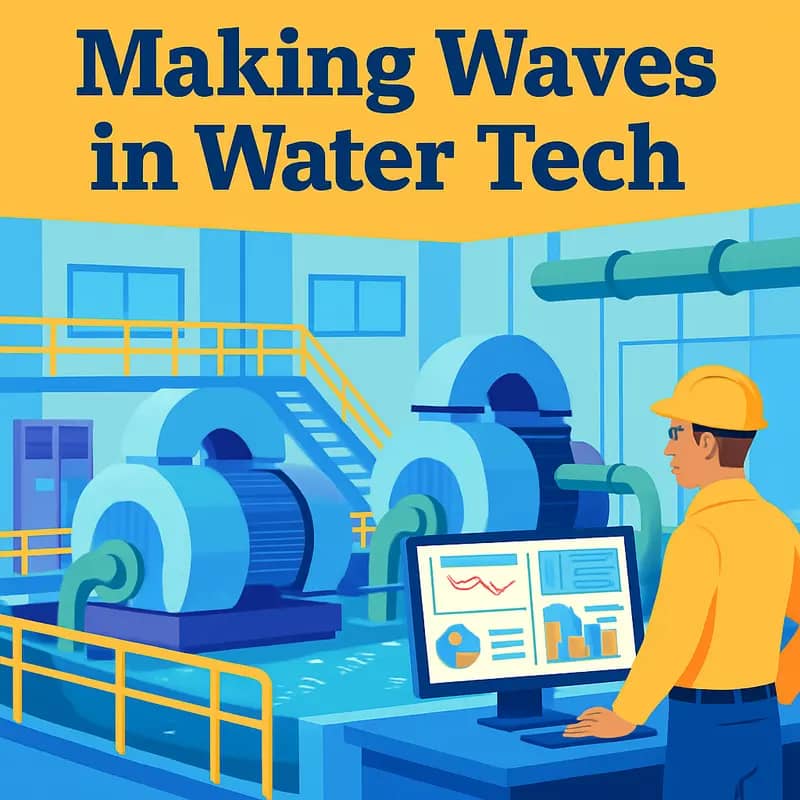
Export Development Canada’s strategic investments in water technology are creating ripples of innovation across the wastewater treatment landscape. Building on their established investment approach, EDC has deployed significant capital into companies developing breakthrough solutions for pressing water challenges.
A prime example is EDC’s partnership with APG-Neuros, a Quebec-based company revolutionizing aeration systems for wastewater treatment. By backing APG-Neuros’ high-speed turbo blower technology, EDC helped scale an innovation that reduces energy consumption by up to 40% compared to conventional systems. This investment exemplifies EDC’s focus on technologies that deliver both environmental and economic benefits.
In the utility infrastructure space, EDC has prioritized investments in digital solutions that enhance operational efficiency. Their portfolio includes smart water monitoring systems, advanced leak detection technologies, and data analytics platforms that help utilities optimize their networks. These investments align with the growing need for infrastructure modernization while supporting Canadian companies’ expansion into global markets.
EDC’s approach to wastewater treatment innovations reflects a comprehensive understanding of market dynamics. Rather than pursuing standalone technology solutions, they favor integrated approaches that address multiple challenges simultaneously. This strategy has led to investments in resource recovery systems that transform wastewater treatment plants into resource generation facilities, producing clean water, energy, and valuable nutrients.
The organization’s commitment to water technology extends beyond direct investments. Through their trade finance solutions, EDC helps Canadian water tech companies navigate international markets and secure larger contracts. This support is particularly crucial for mid-sized companies looking to scale their operations in regions facing acute water challenges.
Significantly, EDC’s water technology investments demonstrate a clear focus on solutions that can be rapidly deployed and scaled across different markets. Their portfolio companies typically show strong potential for international growth, particularly in emerging markets where water infrastructure needs are most pressing.
By maintaining disciplined investment criteria while remaining responsive to evolving market needs, EDC continues to play a pivotal role in advancing water technology innovation. Their investments not only support Canadian companies but also contribute to addressing global water challenges through practical, scalable solutions.
Geographic Focus: The Indo-Pacific Opportunity
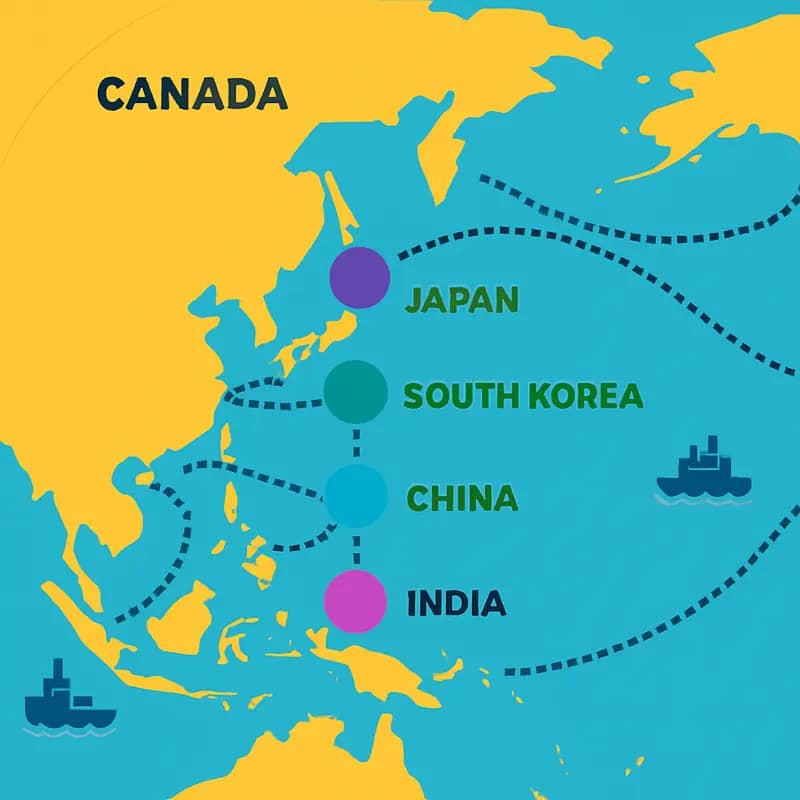
Export Development Canada’s strategic pivot toward Indo-Pacific markets represents a watershed moment for water technology companies seeking international growth. The region’s rapidly expanding middle class, accelerating urbanization, and mounting environmental challenges create an unprecedented opportunity for innovative water solutions.
Vietnam stands out as a priority market, with its industrial zones requiring advanced wastewater treatment capabilities and growing water stress in major metropolitan areas. The country’s ambitious environmental regulations and infrastructure development plans align perfectly with Canadian water technology expertise in areas like smart metering, leak detection, and water quality monitoring.
Thailand’s water sector transformation, particularly in the Eastern Economic Corridor, demands sophisticated industrial water management solutions. EDC’s financial instruments help Canadian companies navigate complex procurement processes while managing currency risks inherent in long-term infrastructure projects. The country’s focus on water reuse and zero liquid discharge presents specific opportunities for membrane technology providers and treatment system integrators.
The Philippines, facing severe water access challenges and aging infrastructure, emerges as a key market for utility modernization solutions. EDC’s risk mitigation tools enable Canadian firms to participate in the country’s water privatization initiatives and public-private partnerships. The archipelago’s vulnerability to climate change also creates demand for flood management and coastal protection technologies.
EDC’s approach goes beyond traditional export financing. Their market intelligence services help companies understand local regulatory frameworks, identify reliable partners, and navigate cultural nuances critical for success in Asian markets. The agency’s relationships with regional development banks and local financial institutions facilitate project financing structures that make Canadian solutions more competitive.
A crucial element of EDC’s Indo-Pacific strategy is its focus on sustainable development. Projects must demonstrate clear environmental benefits and social impact, aligning with both Canada’s international development goals and the region’s sustainability priorities. This emphasis on environmental, social, and governance (ESG) criteria positions Canadian water technology firms as partners of choice for addressing the region’s water challenges.
As explored in how to take mid-market green tech companies to the next level, EDC’s support extends beyond simple financing to include market entry strategy development, local partner identification, and risk management advisory services. This comprehensive approach helps Canadian water technology companies establish sustainable presence in these dynamic but complex markets.
The Indo-Pacific strategy represents more than just market expansion – it’s about positioning Canadian water expertise at the forefront of the region’s environmental transformation. Through EDC’s targeted support, water technology companies can access the capital, knowledge, and partnerships needed to succeed in these promising markets.
Navigating EDC Partnership
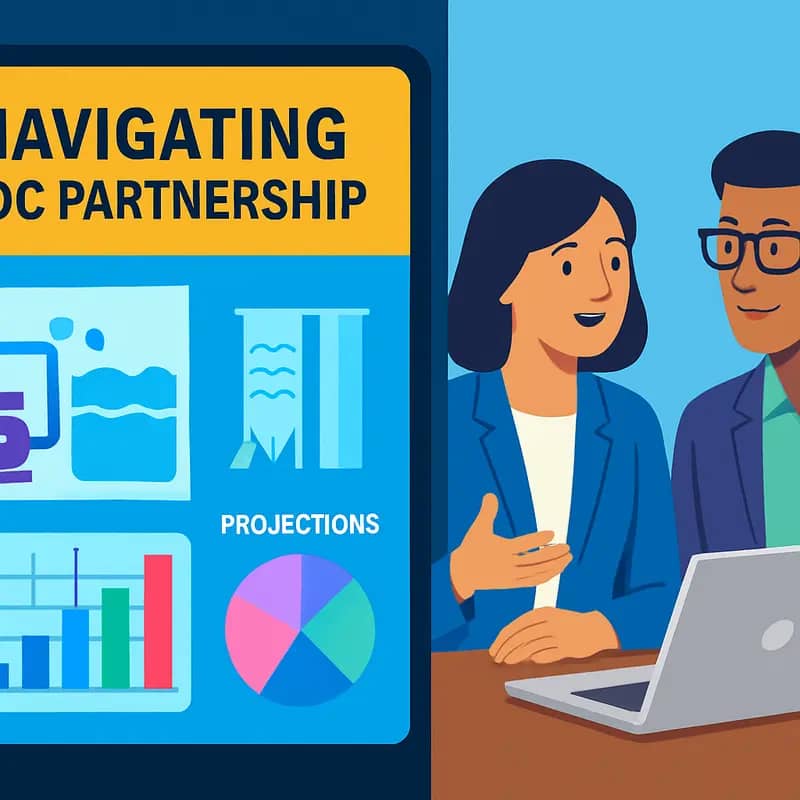
Securing financing through Export Development Canada’s $5B Trade Impact Program requires understanding their structured yet collaborative approach to supporting water technology innovation. Drawing from EDC’s established processes, water entrepreneurs and investors can optimize their engagement through several key pathways.
The first step involves connecting with EDC’s dedicated cleantech team. These sector specialists evaluate companies based on three core criteria: proven commercial viability, strong management teams, and clear market opportunities aligned with EDC’s mandate. Early engagement allows entrepreneurs to refine their proposals based on EDC’s requirements.
For direct financing, EDC offers working capital solutions ranging from $500,000 to $5 million. The application process typically spans 8-12 weeks, beginning with initial screening followed by detailed due diligence. Companies should prepare comprehensive business plans highlighting their technology’s competitive advantages, market validation, and scalability potential.
EDC’s co-investment framework provides additional opportunities through partnerships with venture capital firms and strategic investors. This approach helps companies access larger funding rounds while benefiting from EDC’s risk mitigation tools. Entrepreneurs should explore EDC’s investor network early to identify alignment with potential co-investment partners.
Beyond capital, EDC offers valuable support services that enhance companies’ international growth potential. Their market intelligence resources help identify promising export opportunities, while their trade advisory services assist with regulatory compliance and market entry strategies. Companies can also leverage EDC’s global networks to connect with potential customers and partners.
To maximize partnership value, water technology firms should demonstrate clear environmental impact metrics aligned with EDC’s sustainability goals. This includes quantifiable benefits in water conservation, treatment efficiency, or resource recovery. Companies should also highlight how their solutions address specific challenges in EDC’s priority markets.
Establishing ongoing dialogue with EDC relationship managers helps companies stay informed about new programs and opportunities. Regular updates on business progress, market developments, and strategic initiatives ensure continued alignment with EDC’s objectives. This proactive communication often leads to expanded support as companies scale their operations.
Successful EDC partnerships require patience, thorough preparation, and strategic alignment. Companies that invest time in understanding EDC’s processes and priorities position themselves for meaningful long-term relationships that extend beyond initial funding support. Through careful navigation of these partnership pathways, water technology innovators can access the resources needed to accelerate their global growth.
EDC’s Water Technology Focus: More Than Just Capital

Export Development Canada’s approach to water technology financing goes far beyond conventional capital provision. Through its specialized water sector expertise, EDC has positioned itself as an indispensable strategic partner for innovative companies tackling global water challenges.
At the core of EDC’s water technology focus lies a sophisticated understanding of the water sector’s unique characteristics. The organization recognizes that water innovations often face longer development cycles, complex regulatory requirements, and the need to build trust with risk-averse end users. This deep sector knowledge enables EDC to evaluate water technology companies through a more nuanced lens than traditional financiers.
EDC employs a comprehensive evaluation framework specifically tailored for water innovations. Their assessment considers not just technical viability, but also factors like water efficiency gains, environmental impact reduction, and alignment with sustainable development goals. This holistic approach helps identify truly transformative solutions that can scale meaningfully.
The organization’s commitment to supporting sustainable water solutions manifests through dedicated technical expertise. EDC maintains a network of water industry specialists who provide valuable guidance on market dynamics, regulatory compliance, and technology validation pathways. This support proves especially valuable for emerging companies navigating the complex water sector landscape.
Particularly noteworthy is EDC’s focus on fostering connections between water technology innovators and established industry players. The organization leverages its extensive network to facilitate strategic partnerships, pilot projects, and commercial deployments – critical elements for successful water technology commercialization.
EDC also demonstrates remarkable patience in its water sector investments, acknowledging that meaningful impact often requires sustained support. Rather than seeking quick returns, the organization maintains a long-term perspective aligned with the development timelines typical in water innovation. This patient capital approach has proven essential for breakthrough technologies requiring extended validation periods.
The organization’s water technology focus extends to actively promoting Canadian water expertise globally. Through targeted market intelligence and international business connections, EDC helps position Canadian water innovations in key markets worldwide. This proactive approach to market development has helped numerous companies expand their global footprint while addressing critical water challenges.
Innovative Financing Structures for Water Entrepreneurs
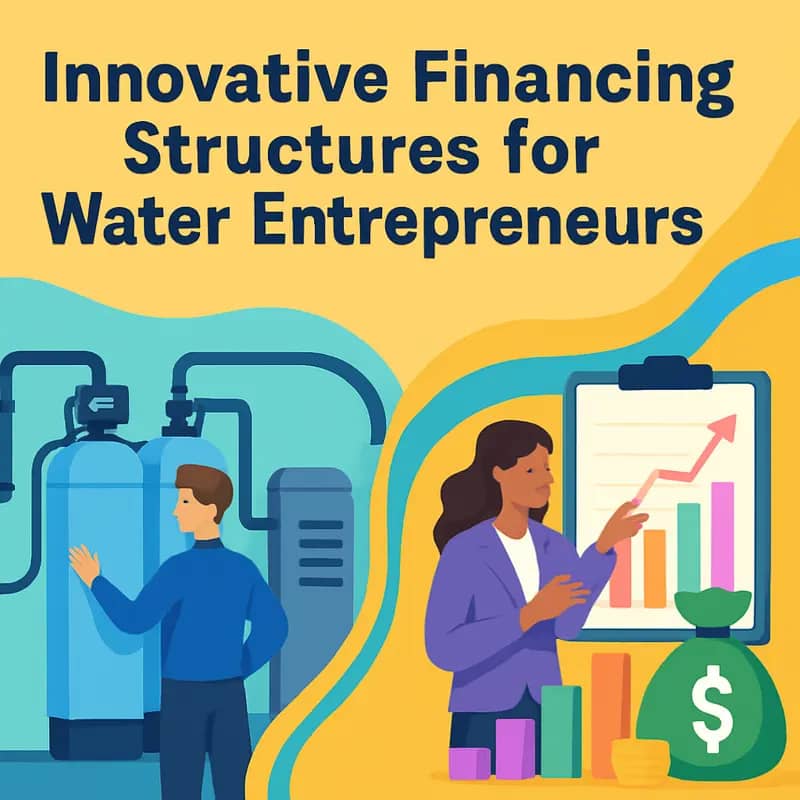
Export Development Canada’s financing toolkit represents a comprehensive approach to supporting water technology innovators through various growth stages. At the core of their offering is a flexible working capital solution that helps companies manage day-to-day operations while scaling their innovations. This includes accounts receivable financing and inventory financing, crucial for maintaining healthy cash flows during expansion phases.
For companies ready to tackle larger projects, EDC provides tailored project financing structures that blend debt and quasi-equity instruments. These typically feature grace periods aligned with project implementation timelines and flexible repayment terms based on project cash flows. This approach has enabled several water technology firms to undertake municipal infrastructure projects they otherwise couldn’t finance independently.
A particularly innovative aspect of EDC’s financing model is their risk-sharing approach. Rather than taking a traditional lender stance, EDC often partners with commercial banks to provide loan guarantees or credit insurance. This arrangement helps water technology companies access conventional financing while EDC helps mitigate the perceived risks that often deter traditional lenders.
One of EDC’s most impactful tools is their cleantech co-investment program. This program matches private sector investments in promising water technology companies, effectively doubling the capital available while providing validation that helps attract additional investors. The program has catalyzed several breakthrough technologies in water treatment and conservation.
Perhaps most notably, EDC has pioneered performance-based financing structures where repayment terms are partially linked to environmental impact metrics. This innovative approach aligns financial returns with sustainability outcomes, creating a powerful incentive for developing truly effective water solutions.
Beyond direct financing, EDC provides bonding solutions crucial for water technology companies bidding on large infrastructure projects. Their contract bonding program helps firms secure the performance and bid bonds often required in public tenders, removing a significant barrier to market entry.
To support early commercialization, EDC offers specialized patent and intellectual property financing. This unique tool allows water technology companies to leverage their IP assets as collateral, providing critical funding when traditional assets are limited.
As explored in a detailed analysis of water technology investment strategies, EDC’s approach demonstrates how strategic financing can accelerate both business growth and environmental impact in the water sector. Their financing structures create a supportive ecosystem that helps water entrepreneurs bridge the gap between innovation and market success.
Risk Mitigation and Market Access
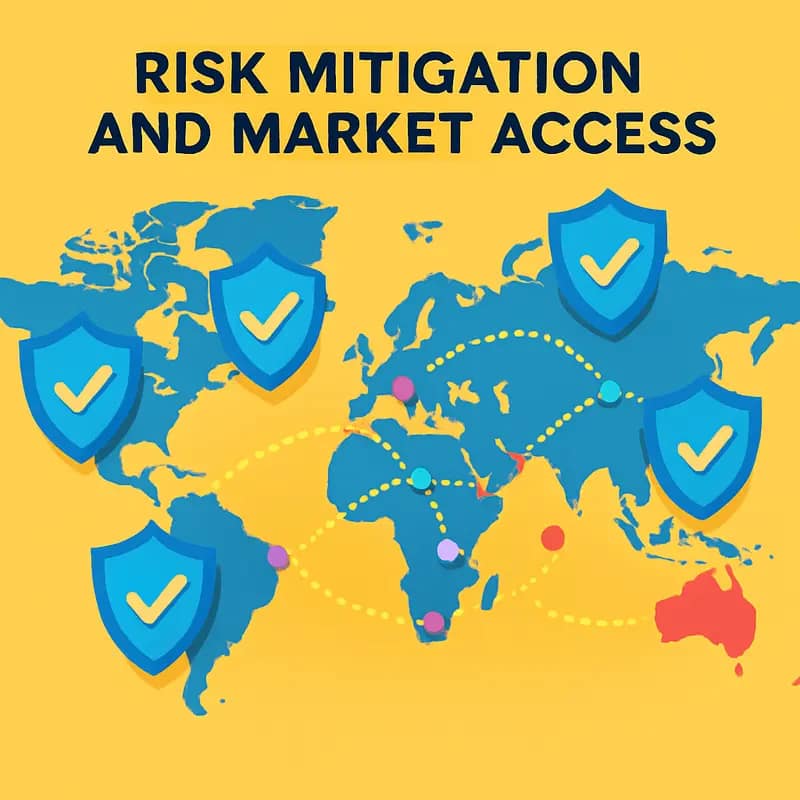
Export Development Canada’s comprehensive approach to risk management and market access serves as a cornerstone for water technology companies seeking international expansion. The organization’s risk mitigation strategy operates on multiple levels, combining financial protection with strategic market intelligence to create a robust support system for Canadian water innovators.
At the core of EDC’s risk management framework lies its insurance portfolio, specifically designed for the water technology sector. This includes comprehensive coverage against payment defaults, political risks, and contract frustration. The program extends beyond traditional insurance by incorporating specialized products that address sector-specific challenges like performance bond requirements and working capital protection.
EDC’s international network proves particularly valuable in opening doors for water technology companies. Through strategic partnerships with financial institutions and government agencies worldwide, the organization facilitates introductions to key decision-makers and potential customers. This network spans regions with acute water challenges, where Canadian solutions can make significant impacts while generating substantial returns.
The organization’s market intelligence services represent another crucial pillar of their support system. EDC maintains dedicated research teams that analyze water market trends, regulatory environments, and competitive landscapes across target regions. This intelligence helps companies identify promising market entry points and avoid potential pitfalls, significantly reducing the risk of international expansion.
A distinctive feature of EDC’s approach is its integration of risk assessment with opportunity identification. The organization doesn’t merely protect against downside risks; it actively helps companies leverage risk management as a competitive advantage. For instance, EDC’s political risk insurance often enables companies to bid on projects they might otherwise have to pass on, expanding their market reach.
The organization also employs a collaborative risk-sharing model, working with local financial institutions to structure deals that distribute risk appropriately while maintaining project viability. This approach has proven particularly effective in emerging markets, where traditional financing mechanisms might be hesitant to engage with water technology projects.
EDC’s risk mitigation strategy extends to intellectual property protection, a critical concern for innovative water technology companies. Through partnerships with legal experts and local authorities, the organization helps companies navigate complex IP landscapes and protect their innovations while expanding internationally.
This comprehensive risk management and market access support has enabled numerous Canadian water technology companies to scale their operations globally while maintaining financial stability and operational efficiency. The approach demonstrates how strategic risk management can serve as a catalyst for growth rather than merely a protective measure.
Impact Measurement and Success Stories
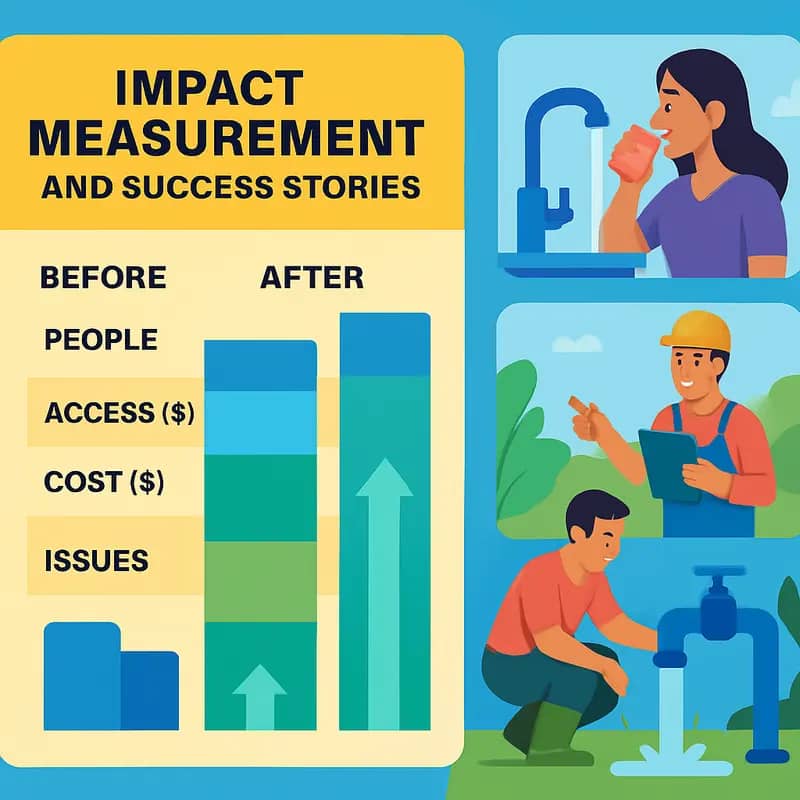
EDC’s commitment to driving measurable impact in the water technology sector is demonstrated through their comprehensive tracking framework and impressive portfolio of success stories. The organization employs a multi-dimensional approach to assess both environmental and social returns on their $5B investment program.
A standout example is their support of an innovative water filtration company that developed sustainable membrane technology. With EDC’s financing and market access support, the company scaled operations across three continents and now provides clean drinking water to over 2 million people while reducing energy consumption by 40% compared to conventional systems. The environmental impact metrics show annual savings of 12,000 metric tons of CO2 emissions.
EDC’s impact measurement framework focuses on four key areas: water savings, energy efficiency, greenhouse gas reduction, and social benefits like job creation and improved public health outcomes. Each investment undergoes rigorous baseline assessment and ongoing monitoring using standardized metrics aligned with UN Sustainable Development Goals.
An illustrative case comes from EDC’s work with a wastewater treatment technology provider. The company’s innovative biological treatment process, scaled with EDC’s support, now handles industrial effluent for major manufacturers while recovering valuable resources. Impact data shows the technology reduces sludge production by 60% while generating renewable energy that powers 40% of plant operations.
Beyond environmental metrics, EDC tracks economic multiplier effects. Their water tech portfolio companies have created over 3,000 direct jobs and catalyzed the formation of specialized supply chains that support thousands more indirect positions. The organization also measures knowledge transfer benefits, with supported companies establishing R&D partnerships with 12 Canadian universities.
To ensure accountability and continuous improvement, EDC publishes detailed impact reports and subjects their measurement methodology to third-party verification. Their framework has become a model for other development finance institutions looking to quantify the broader value creation of cleantech investments.
Perhaps most significantly, EDC’s impact measurement data has helped make the business case for water technology investment. By documenting both sustainability benefits and commercial returns, they’ve attracted additional private capital to the sector. Several of their portfolio companies have gone on to raise significant follow-on funding from mainstream investors.
The organization maintains a database tracking over 50 standardized impact indicators across their water tech investments. This growing evidence base demonstrates how strategic financing coupled with proper impact measurement can accelerate the adoption of sustainable water solutions while generating attractive returns.
Final words
Export Development Canada emerges as a crucial catalyst in the global water technology landscape, offering more than just financial support. Their $5 billion Trade Impact Program, combined with their strategic focus on the Indo-Pacific region, creates a powerful platform for water entrepreneurs and impact investors to scale their innovations internationally. While EDC typically operates as a follower investor rather than a lead, their ability to provide up to $25 million in matching investments and their extensive experience in cleantech make them an invaluable partner for growth-stage water technology companies. Their proven track record in supporting wastewater treatment innovations and major utility infrastructure projects demonstrates their commitment to advancing sustainable water solutions. For water entrepreneurs and impact investors looking to navigate international markets, EDC offers not just capital, but also crucial risk management expertise and market intelligence. The organization’s unique position as a crown corporation, combined with their extensive international network, makes them an ideal partner for those ready to take their water innovations to the global stage.
Wanna explore the Full List of Water Investors that cut at least two checks over the past decade? Check it out and bookmark it, I update it regularly!
Learn more: https://dww.show/the-ultimate-water-investor-database/
About us
Through my “(don’t) Waste Water” platform, I offer unique and insightful coverage of the water industry that combines technical expertise with engaging storytelling. If you haven’t yet, it might be time for you to subscribe to the podcast, the youtube channel and/or the newsletter!
